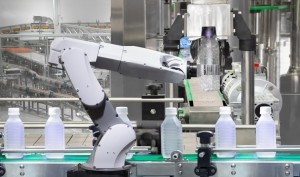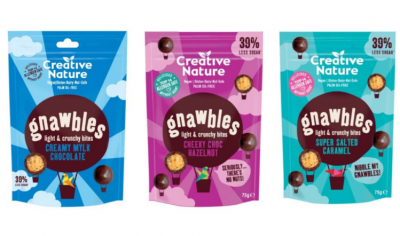Food industry trends
Food industry trends for 2021

Looking into the future is a tricky business. If this time last year anyone accurately predicted what 2020 had in store, they were likely either to be in possession of supernatural powers or to have a talent for dystopian fiction.
Nevertheless, Food Manufacture spoke to key figures with their fingers on the pulse to gauge the trends and opportunities in the industry for 2021.
The Brexit effect
There’s no doubt that the issue dominating the headlines over the past five years has been Brexit. Now, at last, the details have been settled and the UK government’s announcement just before Christmas of a trade deal with the EU was met with relief, albeit mixed with caution.
There are still questions to be answered regarding the deal’s impact on the food industry – in the short, medium and long term – but Ian Wright, chief executive of the Food and Drink Federation (FDF), believes shortages, at least, have been avoided:
“The nature of the disruption caused by Brexit is quite difficult to see. I certainly don't think we'll see food running out.”
Nick Allen, chief executive of the British Meat Processors Association (BPMA), points out that aspects of the new system are untested, and the industry might well have a different set of challenges to deal with.
“We may not even be able to export our products if the newly installed, but as yet completely untrialled, certification systems cannot cope with the huge extra demand that will inevitably hit in January,” he says. “And, at the same time, we could be facing the prospect of having to fight off imported meat produced to lower standards.”
Gordon Polson, chief executive of the Federation of Bakers (FoB), plays down the Brexit effect in 2021, but does sound a note of caution on bakery exports:
“One impact of Brexit will be for some people who export a very small proportion of their output. Having to comply as a country outside the EU, they’ll wonder whether it's actually worth continuing to export. But whether it will really impact on trends as far as we're concerned, I don't think significantly.”
While Paul Baker, founder of St Pierre Group, believes the most widespread effect will be felt in imports, he’s keen to accentuate the positive where Brexit is concerned:
“As a nation, around 30% of our produce is imported. That means everyone will feel the impact, but it also presents an interesting opportunity for UK producers. It will automatically give them a ‘home advantage’. That’s the optimist in me. There is opportunity in everything – it just depends on your perspective. I’m also pragmatic – we need to crack on and make the most of it.”
Pandemic challenges
While questions remain over the Brexit effect for 2021, at least some form of trade deal brought negotiations to a conclusion. Such a note of finality has, of course, not been sounded in the case of the COVID-19 pandemic. Despite medical advances, the emergence of a new, highly infective strain has led to increased restrictions and the prospect of significant disruption for some time yet.
However, the FDF’s Wright is optimistic that there is light at the end of the tunnel:
“As the year goes on, I would say we'll see, hopefully, the vaccine and mass testing take us in the direction of normality.”
But even if that optimism is justified, Wright concedes that it doesn't mean we'll return to the old ways of working. There are trends that have developed during the pandemic that he believes will remain, such as working from home and the decline in commuting. That could have some profound consequences for the industry, he warns:
“The normal pattern of consumption, pre-COVID, was that 70% of our food was bought via retail shops, and about 30% was away from home. That model dictated the kind of food that producers and manufacturers created and had an effect on margin. The margin that you were able to get through out-of-home, particularly through hospitality, dragged the overall margin up because it was higher.
“Now, we have a situation where that out-of-home food is reduced to 5% or 10%. And if supermarkets and other retailers are selling 80% or more of our food, then the downward pressure on margin is pretty significant. And that's obviously very difficult for manufacturers, producers and importers. If that continues, the economics of the industry will change quite radically.”
Pandemic opportunities
Allen of the BPMA sees a continuing upside to the shifting of the balance towards supermarket-bought food:
“British meat, along with cooking from scratch at home, has had a bit of a rejuvenation among consumers. We noticed it first during the first lockdown when mince flew off supermarket shelves and caused what’s known as ‘carcase imbalance’.
“Under normal conditions, there is a finely balanced market for all parts of the animal, with very little going to waste. The surge in demand for mince caused an imbalance and resulted in an oversupply of the higher value cuts like steaks. However, after some innovative promotion by the supermarkets, people bought up these other cuts as well.”
Allen believes 2021 will see even more people develop a new-found enthusiasm and willingness to tackle home cooking from scratch, and that will bring more opportunities:
“It’s the job of the processors and retailers to make sure they are supplying meat in the right way with the right information to build on this renewed interest in cooking.”
Rodney Steel, chief executive of the Association for Contract Manufacturing, Packing, Fulfilment & Logistics (BCMPA), also sees opportunities among the challenges arising from the pandemic:
“With the long periods of lockdown in 2020 resulting in the closure of many pubs and restaurants, the decrease in demand from the hospitality sector has required dexterity by manufacturers, necessitating a switch to different types of production to keep lines moving. For food retailers, the challenge has also been to move a number of SKUs from the store shelves to being available online. This has resulted in changed pack sizes and stock rationalisation.
“White label and private label goods are experiencing huge growth. We have seen a real increase in enquiries from companies and entrepreneurs across the UK and internationally for these products in everything from granola and cornflakes to flavoured coffee drinks and plant-based alternatives.”
Steel says the emergence of smaller brands and marketeers who have identified opportunities for new products, and are often using e-commerce and online stores to bring them straight to market, is a significant factor in this growth:
“Outsourcing plays a key role in this process with many of our members not only manufacturing and packing but also providing a turnkey service with the despatch of individual items direct to consumers as part of their fulfilment and logistics offering. This trend will undoubtedly continue into 2021.”
Plant-based growth
The plant-based food market is clearly still firmly on the rise. According to a report by Deloitte, UK consumers account for nearly 40% of the European meat substitute market. This has spurred innovation among brand owners within the food and beverage market, says Steel:
“There has been a sharp increase in the number of enquiries into the BCMPA searching for both plant-based and vegan alternatives in 2020 and this is expected to continue to grow.
“As such, the need for NPD on cutting-edge novel food ingredients is constantly evolving and to support this there is increased investment into the technology and machinery as production methods are developed to keep up with the latest demands.”
Tasneem Alonzo, joint managing director of EHL Ingredients, agrees that meat-free and plant-based foods are set to continue their popularity during 2021:
“We’ve seen bakeries launch vegan versions of existing products, from sausage rolls, pasties and pies, croissants, and pains au chocolat, with smaller regional bakers launching their own versions of vegan sweet and savoury baked goods.
“Flapjacks, nutrition bars, seeded and nut snacks, biscuits and cookies, cakes and brownies are already popular choices in vegan bakeries, and we’re seeing an increase in savoury plant-based baked items such as quiches, pies, crackers and breads.”
St Pierre’s Baker believes the pandemic has contributed to the growth of the plant-based trend:
“Lockdown accelerated adoption of a part-time approach to veganism, with the Vegan Society reporting a significant uplift in applications to use its logo and industry giants upping the applications for trademarks on vegan lines – including Unilever, Sainsbury’s, Tesco, Lidl and even IKEA getting in on the action, with the launch of ‘plant balls’ this past summer.
“I have no doubt that this is a trend that was on last year’s list and will remain a talking point for the next decade as more people adopt a similar approach.”
Environmental concerns
Protecting the environment has been on the industry’s radar for as long as anyone can remember. It seems eco issues are set to claw their way back towards the top of the agenda as the pandemic (hopefully) comes under control, says Wright of the FDF:
“Environmental concerns will play more of a part in 2021. I think it's been suspended a bit, actually, because of the pandemic. But I think plastics, packaging, net-zero carbon – all those environmental factors will be more prominent, particularly as 2021 goes on.”
The FoB’s Polson agrees, insisting the baking industry is well aware of the part it can play:
“We’re signatories to Courtauld 2025 and we're very conscious of our responsibilities. I'm sure as things get back to normality, environmental issues will become more prominent on the agenda again – not that they've really gone away.”
Allen of the BPMA is aware that meat will continue to feature in debate on climate change in 2021 but urges nuance:
“Until now, the loudest voices have sought to demonise the role of meat by using average global figures or even disinformation to make their case. However, these figures often fail to differentiate between sustainable livestock systems like the ones we have in the UK, New Zealand and Ireland and systems that rely on unsustainable practices, like in Brazil.
“I think it’s important that the industry embraces the climate change issues, explains clearly that buying British means buying into a lower carbon footprint, and dispels the huge amount of misinformation that’s currently out there.”
The BCMPA’s Steel says the demand for sustainability is now core to the sector, both in terms of businesses’ operations and the products they design, manufacture, and deliver for clients:
“Minimising impact on the environment – from the recyclability and reusability of packaging to transportation efficiencies – means sustainability is now a major part of the decision-making process and our members have reacted and continue to do so to meet this need.
“The agility and responsiveness of BCMPA members makes them the perfect partners for outsourcing. With their ability to provide solutions and overcome the challenges of this year, they remain a very important part of the supply chain and we expect this to continue into 2021.”
Rise of the robots
Wright of the FDF predicts manufacturers will be looking to automate increasingly in the post-Brexit environment of 2021:
“The big issue this time last year was the fear of labour shortages. Clearly, the pandemic and the impact it will have on unemployment will have some effect there, although it doesn't seem particularly obvious that employees who are let go by hospitality are willing to work in food manufacturing. Maybe that hasn't had time to work out, but I suspect that automation will be a theme.”
Mark Yeeles, VP of industrial automation at Schneider Electric, agrees such technology could come to the fore:
“The adoption of universal automation will enable manufacturers to create a step-change in operational improvements capable of keeping up with the speed of doing business and remaining competitive in the global market.
“New business models will be enabled, new customers reached, and new markets served, reshaping post-Brexit, post-pandemic Britain for the better.”
Despite all these forecasts, if 2021 plays out in a similar way to last year, there remains the potential for curveballs to keep us on our toes. If the past year has taught us anything it’s that you can’t plan for everything, so try to be as flexible and adaptable as you can.






















